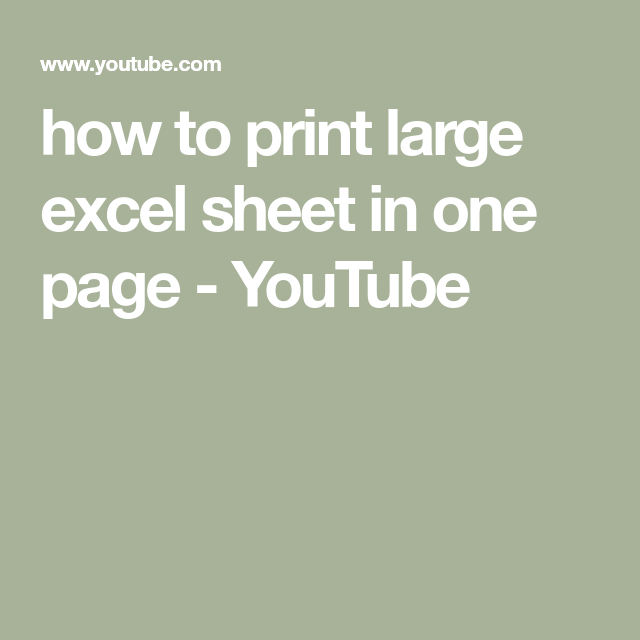How to Print a Larger Excel Sheet: Simple Steps

When dealing with large Excel spreadsheets, printing them effectively can be a daunting task. Whether you need to print for a presentation, a meeting, or for archival purposes, managing the layout and content on the paper is crucial. In this comprehensive guide, we will walk through the simple steps to print your large Excel sheet, ensuring that your data looks professional and is easy to read.
Step 1: Adjust Page Layout

The first step in printing a large Excel sheet involves setting up the page layout:
- Page Orientation: Go to the Page Layout tab, and under Orientation, choose Landscape or Portrait based on your data distribution.
- Margins: Adjust the margins to minimize wasted space while ensuring the printout remains legible.
- Scaling: If your data fits on one page, scaling can be set to 100%. Otherwise, adjust the scaling options under the “Fit to:” settings to fit multiple pages.
Step 2: Set Print Area

Excel allows you to define a specific area to print:
- Select the cells you wish to print.
- Go to Page Layout > Print Area > Set Print Area. This confines printing to only your selected range.
📌 Note: Remember, changing the print area will override any previously set areas.
Step 3: Preview Your Print

Before hitting print, use Excel’s Print Preview:
- Go to File > Print or use the keyboard shortcut Ctrl+P to open the preview.
- Review how your data will appear on paper, check for headers, footers, and page breaks.
Step 4: Adjust Page Breaks

To ensure your data does not split awkwardly across pages:
- Enable Page Break Preview from View > Page Break Preview.
- Manually drag page breaks to ensure your data fits neatly onto pages.
- Use ‘Insert Page Break’ and ‘Remove Page Break’ options from the Page Layout tab as needed.
Step 5: Format for Print

Make sure your sheet is formatted for print:
- Fonts and Sizes: Use standard fonts like Arial or Times New Roman. Keep font sizes legible for printouts.
- Headers and Footers: Add headers or footers for context or page numbers (Insert > Header & Footer).
- Gridlines and Headings: Decide if you want gridlines and row/column headings to be printed (Page Layout > Sheet Options).
📌 Note: Headers and footers might not print if your print area does not include those rows or columns.
Step 6: Use Page Break Preview for Final Adjustments

Return to Page Break Preview to make any final tweaks:
- Check if data is cut off or if pages are underutilized.
- Adjust page breaks, scaling, or print areas as necessary.
Step 7: Print or Export

With all adjustments made:
- Click on ‘Print’ in the Print Preview window or use Ctrl+P again for direct access.
- Ensure your printer settings match your Excel setup.
- Alternatively, consider exporting to PDF for digital distribution or archiving.
Printing a larger Excel sheet involves a balance between readability and professional presentation. By following these steps, you ensure that your data is displayed clearly, and your document serves its intended purpose efficiently. Whether you're preparing for a business meeting, an academic conference, or simply need to review your data in a tangible format, these techniques will help you present your Excel work in the best possible light.
How can I print multiple sheets at once in Excel?

+
In Excel, select the sheets you wish to print by holding down the Ctrl key while clicking on each tab. Then, go to File > Print to preview all selected sheets. Ensure your printer is set up to handle multiple print jobs or choose to print to PDF to combine sheets into one document.
Why do my Excel headers not print?

+
This usually happens if the print area does not include the row or column where the headers are located. Ensure you include these in your print area, or adjust your headers to print on every page by setting up the header/footer options in Page Layout.
Can I change the print orientation for just part of my spreadsheet?

+
No, Excel does not allow different orientations on the same page. However, you can set up different print areas with their own orientations by using page breaks or print different sections manually one at a time.